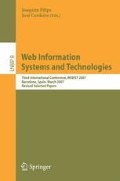Abstract
Mobility is an intrinsic property of learning encompassing spatial, temporal and developmental components. Students’ expectations on how and when they learn are creating increasingly heavier demands upon all aspects of their learning. Young people in particular have made mobile devices fundamental to their daily lives. However, educators and developers are faced with the dilemma: do you develop applications for the mobile or the wired environment? In this paper we argue that learning environments will remain combinations of wired and wireless for the foreseeable future. However, not all affordances offered by wired environments are transferable to small mobile devices. In fact, some tasks are better served by applications that are designed to be entirely mobile. The paper will present initial results and evaluations of five of learning tools with the properties mobility, flexibility and either instructor- or student-generated content.
Access this chapter
Tax calculation will be finalised at checkout
Purchases are for personal use only
Preview
Unable to display preview. Download preview PDF.
References
Vernon, R.D.: Cornell data networking: Wired vs.wireless? In: Office of Information Technologies, vol. 2006, Cornell University, Ithaca (2006)
Easton, J.: Going wireless: Transform your business with mobile technology, Harper Collins, New York (2002)
Smørdal, O., Gregory, J.: Personal Digital Assistants in medical education and practice. Journal of Computer Assisted Learning 19, 320–329 (2003)
Altmann, T.K., Brady, D.: PDAs bring information competence to the point-of-care. International Journal of Nursing Education Scholarship 2 (2005)
Perry, M., Michael Jacob, J.: PDA in the classroom project. In: 2005 Illonois-Indiana Sectional Conference, Americian Society for Engineering Education, Northern Illinois University, DeKalb (2005)
Boonn, W.W., Flanders, A.E.: Survey of Personal Digital Assistant use in radiology. RadioGraphics, 537–541 (2005)
Johnson, D.W., Rudd, D.: Will handheld computers succeed in college? In: Colton, D., Tastle, W.J., Hensel, M., Abdullat, A.A. (eds.) ISECON 2003. §4113, San Diego (2003)
Vogel, D., Kennedy, D.M., Kwok, R.: Do Mobile Device Applications Lead to Learning? In: Montgomerie, C., Seale, J. (eds.) EDMEDIA 2007, Association for the Advancement of Computers in Education, Chesapeake VA, pp. 555–564 (2007)
Zheng, P., Ni, L.M.: Smart phone & next generation mobile computing. Elsevier Inc., San Francisco (2006)
Vavoula, G., Sharples, M.: KLeOS: A personal, mobile, knowledge and learning organisation system. In: Milrad, M., Hoppe, U., Kinshuk (eds.) WMTE 2002, Institute of Electrical and Electronics Engineers (IEEE), Vaxjo, Sweden, pp. 152–156 (2002)
Sharples, M., Taylor, J., Vavoula, G.: Towards a theory of mobile learning. Mobile technology: The future of learning in your hands. 58 (2005)
Naismith, L., Lonsdale, P., Vavoula, G., Sharples, M.: Literature review in mobile technologies and learning, FutureLab, Bristol, UK, vol. 48 (2005)
Kennedy, D.M., Vogel, D.R., Xu, T.: Increasing opportunities for learning: Mobile graphing. In: Atkinson, R., McBeath, C., Jonas-Dwyer, D., Phillips, R. (eds.) ASCILITE 2004: Beyond the Comfort Zone, Perth, Western Australia, pp. 493–502 (2004)
Kozma, R.B.: The use of multiple representations and the social construction of understanding in chemistry. In: Jacobson, M., Kozma, R. (eds.) Innovations in science and mathematics education: Advanced designs for technologies of learning, Erlbaum, Mahwah, NJ, pp. 11–46 (2000)
Kremer, R.: Visual languages for knowledge representation. In: Eleventh Workshop on Knowledge Acquisition, Modeling and Management (KAW 1998), Knowledge Science Institute, Banff, Alberta, Canada, vol. 2006 (1998)
Csete, J., Wong, Y.-H., Vogel, D.: Mobile devices in and out of the classroom. In: Cantoni, L., McLoughlin, C. (eds.) EDMEDIA 2004. Association for the Advancement of Computing in Education, Norfolk VA, pp. 4729–4736 (2004)
Vogel, D., Kennedy, D.M., Kuan, K., Kwok, R., Lai, J.: Do Mobile Device Applications Affect Learning? In: Sprague, R.H. (ed.) HICSS-40, Hawai’i. Institute of Electrical and Electronics Engineers (2007)
Author information
Authors and Affiliations
Editor information
Rights and permissions
Copyright information
© 2008 Springer-Verlag Berlin Heidelberg
About this paper
Cite this paper
Kennedy, D.M., Vogel, D. (2008). Improving the Flexibility of Learning Environments: Developing Applications for Wired and Wireless Use. In: Filipe, J., Cordeiro, J. (eds) Web Information Systems and Technologies. WEBIST 2007. Lecture Notes in Business Information Processing, vol 8. Springer, Berlin, Heidelberg. https://doi.org/10.1007/978-3-540-68262-2_24
Download citation
DOI: https://doi.org/10.1007/978-3-540-68262-2_24
Publisher Name: Springer, Berlin, Heidelberg
Print ISBN: 978-3-540-68257-8
Online ISBN: 978-3-540-68262-2
eBook Packages: Computer ScienceComputer Science (R0)

